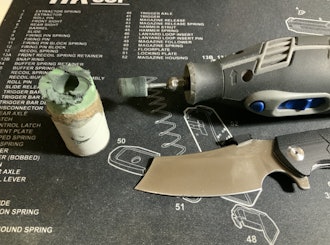Click to view our Accessibility Statement or contact us with accessibility-related questions







Sorry, My Felidar Guardian Ate My Homework - Massdrop East/West: Article #7

search
close
Sort by: Newest
keyboard_arrow_down
Let’s get the conversation started!
Be the first to comment.
Related Posts
BillA2021
Buy replacement quartz movement
Is an original quartz movement or a suitable substitution available for my Wenger 7900X watch at a reasonable cost, or is this not feasible I’m new at this. Thanks.
Mar 18, 2021

reswright
Basic Flip Smoothing
So you picked up a budget bearing knife as a ‘project’ knife to putter around with and you’re looking for ideas? One thing you can do is polish the bearing works, smoothing both the flip and the close action until you've got some semblance of a noiseless flick open and a smooth, gravity drop shut. This can be done many, many different ways, as many ways as there are to smooth and then polish metal; your humble narrator prefers to use a Dremel, using the following steps. I should probably make some kind of disclaimer statement here - this guide is for people already handy with a Dremel. If you’re not already handy with one it’s best not to learn how to use one while handling pocket knives or other sharp and pointy things. Hand held high RPM rotary grinding tools can be surprisingly violent if they get out of your firm grasp, they can impart an astonishing amount of kinetic energy to small sharp things you're trying to polish, sending them flying further and faster than...
Feb 6, 2021
RayF
RayF's Guide to Thanksgiving Day Watches
Please do enjoy your Thanksgiving (for those of you in countries where that means something), but please, please, please--whatever you do--don't wear either of these tacky watches while you're doing it!
Nov 26, 2020
Trending Posts in More Community Picks

Graham88
Completely surprised by the lack of blade diversity here on Drop...
I’ve been a collector of Blades since before my teens, and a retailer coming up on 15… or maybe 20 years. Drop has really been kind of an interesting experience for me, because I do occasionally get to see some unusual tech and sometimes EDC items that otherwise I might not have been aware of. And maybe it’s because I have a deep love of cutlery and bladed weapons, but I find myself trolling through the site looking at it what’s available; and it’s just it’s pretty much the same. And the bladed community here is just always confused me.. every single knife is about the same, they’re almost all drop points and although the handle materials change and brands change.. it’s really just the same knife over and over and over again... occasionally you’ll see a tanto or a slight variant; but rarely… and almost never a serrated blade. And I’m just deeply amazed at this diversion of serrated blades. And I’m just surprised there isn’t more of a request for diversity here.... and I...
Mar 12, 2020
JellyDPhoto
Can we get Sony E-Mount or other mirrorless camera options please..
Would be nice to see some Sony E mount full frame cameras on here. I currently shoot with a A99 and they killed the lense path for better or more option lenses and now is all E-Mount. 🤔
Jan 13, 2020
RayF
There Are Pandas, and Then There Are Pandas.
And this isn't either of them! The Pandas we're talking about here, are watches, not bears. And what got me thinking about them (again) was a link posted this morning by @cm.rook who pointed a few of us to the very attractive (and not terribly priced) Yema "Rallygraph" Panda which, in it's most traditional arrangement, looks like the one on the left, but can also be had in the version on the right: The model on the left is a true Panda, while the model on the right is called a reverse Panda. The reason for that distinction is clear--Panda bears, only come in the first arrangement. Now at this point, everyone should be thinking about the most well-know Panda, The Rolex Panda, which is actually a Daytona, and among Rolex Daytonas, the most famous of which is the Paul Newman Daytona, which was famous first, because it was Paul's, and second because it sold at auction for $17.8 million (US Dollars). The story of that auction is well-known so I'll only...
Nov 8, 2019






Research In a macro sense, the objectives of your research are to figure out a deck to play, learn how to build and play it, and learn how the other decks in the meta tend to be built and played. Gaining well rounded knowledge of the format as a whole will pay dividends as you use your expertise to out-build, out-play, and out-sideboard your foes. With these goals in mind, what should you be investigating?
General metagame trends - The metagame provides a context for your other analysis. A deck, strategy, or card choice cannot exist in a vacuum; it must take into consideration what opposition you might face. Finding a deck that can take advantage of the metagame is a key part of deck selection and tuning, but it can be easier said than done. Other folks are also trying to do the same thing. Nowadays, metagames can shift quickly as results spread quickly online. Standard can sometimes shift week to week in paper tournaments. Note that the Magic Online metagame tends to move around much faster as it is quick and easy to obtain cards. On the opposite end, older formats in paper will be more stable as people tend to stick to one deck. Avoid assigning too much weight to the metagame trends as there is volatility and it is a possible outcome to face unpopular decks round after round. Let the meta help steer your effort but never too strictly.
Brews and rogue decks - There is immense competitive edge to be gained by playing a brew or rogue deck in a tournament. Opponents might have trouble deducing what cards you run and will lack experience in gameplay and sideboarding. Of course, the challenge is finding a brew which is competitive enough in the first place- a metagame of known decks develops because those strategies are proven powerful. Out of many brews you research, it is possible that none are worthy of competition. Despite the rarity, the surprise factor can be worth so much for your win percentage that it is worth the effort to at least look around and try some. One awkward part is that if you have found a competitive brew, it is possible that other people know about it already. You will need to judge this aspect over time as you keep current with your sources. The recent dominance of the new Death's Shadow deck in Modern is an example where the factors lined up well. It was available to look at on the internet, but unlike Eldrazi Tron, did not get any meaningful attention. Although a significant portion of the GP Vancouver success came from the inherent power of the deck and the strength of the pilots, I can safely assume that the opponents were at a major disadvantage simply from having no experience against this new build.
Tech choices - Sometimes a specific card or strategy shift can change the shape of a matchup. The newer the tech, the better your chances of catching someone off guard so it is imperative to be on the lookout for spicy options! One key example from history was the adoption of Keranos in Modern UR Twin sideboards for the Jund matchup. Postboard, Jund would have lots of Abrupt Decays, Terminates, Inquisitions, and maybe even a Golgari Charm thrown in, so that they could protect against the infinite combo as well as potential Blood Moons. Keranos happened to sidestep each of these, and once it hit play, it was hard to beat. As Keranos hit the mainstream, people eventually adopted counter-tech: Deglamer. It protected you from Keranos while still being playable as a Disenchant in other matchups and coincidentally has a character with purple energy flowing out of his right hand.
Deck tuning - Once you have narrowed down on an archetype, you will need to decide on a 75. Nothing beats trying things out for your own, but given the vast number of options available, you might need to take advantage of other people's work. Variance can throw a wrench into your analysis, but perhaps there are some conclusions you can extract from the intersection of good results and popularity.
Tips and tricks - It is always fun to discover new special interactions and outside-the-box plays. Learning the possible corner case lines and options is an important part of mastering your deck and one of my favorite parts of Magic. Make sure to avoid fancy play syndrome; sometimes we tunnel vision on a non-intuitive sequence, even though a simpler option may have been available. It is better to win than to lose cleverly.
Sideboarding advice –
Despite the bad reputation I alluded to in the form of this outdated meme, I get a ton of mileage out of sideboard guides and use them in my tournaments. I would adjust what I do based on what I see and things that happen, but as someone that frequently hops around to different decks, I usually lack the experience necessary to formulate the complete list of swaps on my own. Go find out what other people think to get a head start in understanding a certain matchup, then use that as a stepping stone to understand the deeper nuances. Make sure to put your findings to practice. For extra credit, research how other decks might sideboard against your deck - you might find an opportunity to outmaneuver.
Sources of Information Now you should have a clear idea on what to seek. Keep in mind that not all information is beneficial information. Sometimes you will get led down the wrong path, but as you grow as a player, your filter for good ideas vs. bad ideas will improve. So, where should you be looking?
Articles - Every week, a multitude of articles go up around the web on different card sites. Even Massdrop has gotten in on the action (you can find links to previous ones below). I make it a habit to check articles every day. I try to focus my time on the articles pertinent to the format for the next tournament but will at least skim useful articles for other formats so I do not miss anything I could use later. If someone writes an in-depth article about a deck I am considering, I will give it a pretty thorough read-through as it will likely contain tech choices, tuning, tips, and sideboarding advice.
Tournament results - Decklists from Grand Prix, Pro Tours, Magic Online Leagues, and lots of other events get posted online soon after each event's completion. Websites with results aggregation like MTGGoldfish are extremely useful as they list a large quantity of results in an organized manner with some useful search and analysis available. There is a metagame breakdown estimate and you can dive into a specific archetype and find out how lists for it vary. I can attempt to predict metagame trends or find cool brews and tech. Just remember as I mentioned before - the Magic Online metagame moves a lot faster than in paper which can make predictions difficult. One thing to keep in mind is that while online players might be prepared for a certain deck, strategy, or piece of tech that is making the rounds on Magic Online, plenty of people you face at a PPTQ or Grand Prix will not be prepared.
Twitch - At any given time, you can find people streaming a variety of formats on Twitch. Useful information need not come from the most popular streamers; you might be able to have a productive conversation with someone that has a small number of viewers. Though, try not to be a nuisance - instead of bugging for a decklist, wait for sideboarding after game 1 and take a screenshot. Sometimes there will be a deck command, or information could be posted on the streamer's Twitter.
Local playgroup - When you consume a lot of information, it is important to discuss it with others to try to filter down to the useful ideas. A Facebook chat with your local playgroup is a convenient way to accomplish that. If one does not exist yet, start one! Beyond the research aspect, there are a lot of obvious benefits to having a playgroup with which you can chat, test, and travel.
Reddit - Back in the days when we were known as East West Bowl, we were able to find some solid lists and tech pre-PT on r/spikes. Since then, I check the top posts each day on r/spikes and r/magictcg.
Youtube videos - Almost always, Youtube videos will be associated with a specific article, but the related videos on the sidebar can be useful for further exploration.
Twitter - There is not a lot to be gained from Twitter, but some players will share decklists to the public on this platform.
Game-Day Prep The MTR as of the January 2017 edition states:
I find this opportunity incredibly underutilized across all levels of play. Before the tournament, I compile a list of the possible decks in the meta. The goal is to have a reference that can help me predict what cards are in my opponent's list. One of the main ways this comes up is in terms of sideboard cards. If I am playing Dredge, I need to have some idea of when to expect Rest in Peace, Grafdigger's Cage, Leyline of the Void, Relic of Progenitus, Scavenging Ooze, Nihil Spellbomb, or Surgical Extraction. That way, I know what cards to bring in to fight the hate and what sort of hands I should think about keeping. My opponent could be playing different hate cards in the sideboard, but my sheet at least gives me a convenient reference so I do not need to memorize the entire format. If my opponent's archetype is not on the sheet at all, I can try to extrapolate what he might have by looking at other decks. In this example, I would notice that Snapcaster decks will only play Surgical Extraction to not mess up their own plan, BGx decks gravitate towards Nihil Spellbomb and Ooze, and Tron decks usually have Relic and/or Cage to go with Ancient Stirrings. Successfully predicting what cards your opponent will take out and bring in provides a significant edge.
To create the meta sheet, I use a results aggregator as a starting point and walk through all the different archetypes. For each archetype, I try to select a list which is optimal in terms of how recent and level of exposure - the idea is to find a list that best approximates what an opponent at my tournament might show up with. On occasion this means grabbing a list from a popular article. Sometimes I will grab multiple lists per archetype to cover enough variation in terms of the maindeck and sideboard. After I have all my lists, I format and shave as necessary to get it to around two double-sided pages. The blank spaces next to the lists provide a convenient spot for sideboarding notes. These notes can include what cards should come in and out, special considerations for play vs. draw, or specific cards to watch out for. Since they are right next to the enemy decklist, I can think about how I might need to vary what I am doing based on what my actual opponent had compared to what my assumptions were going into the match.
Closing Thoughts The amount of time you should spend on research versus playtesting comes down to personal preference and attributes. At minimum, you should feel comfortable playing games versus the most popular decks in the meta. From there, you have a lot of options on what you want to investigate and what sources you want to use. If you are a long-time Burn player, you would not get much use looking for new brews, but keeping current with metagame trends would help you build an optimal sideboard.
Too many players leave edges on the table and I hope you now feel equipped to seek out these advantages. If you are still a non-believer, check out the origin of the legendary Trapper Keeper (aka just a simple folder for my notes) - https://youtu.be/VCEvHceK0To?t=253. Hardened Scales with Nissa was a new deck and nobody had many reps with it. We originally found it by scouring Magic Online lists and I crowdsourced tuning and sideboarding advice from my teammates and friends. I was quite happy with my finish that tournament. Doing your homework pays off!
Thanks for reading, and please post any questions below.
If you are curious about our team, check out our intro here: https://www.massdrop.com/talk/1117/announcing-team-massdrop-east-west
Or, check out our previous weekly articles:
1. How to Prepare for an MtG Pro Tour by Ben Weitz
(https://www.massdrop.com/talk/1158/how-to-prepare-for-an-mt-g-pro-tour)
2. Approaching New Magic Drafts by Ari Lax
(https://www.massdrop.com/talk/1193/approaching-new-magic-drafts)
3. Constructed Testing for Pro Tour Aether Revolt by Jarvis Yu (https://www.massdrop.com/talk/1213/recap-of-constructed-testing-for-massdrop-east-west-for-pro-tour-aether-revolt)
4. Breaking into Eternal Formats - Case Study: GP Louisville by Jon Stern (https://www.massdrop.com/talk/1240/breaking-into-eternal-formats-case-study-gp-louisville-massdrop-east-west-article-4)
5. In Good Company - Top 8 at GP Vancouver by Eric Severson (https://www.massdrop.com/talk/1285/in-good-company-top-8-at-gp-vancouver)
6. Adapting to Full Block Kaladesh Limited by Jiachen Tao (https://www.massdrop.com/talk/1323/adapting-to-full-block-kaladesh-limited-massdrop-east-west-article-6)